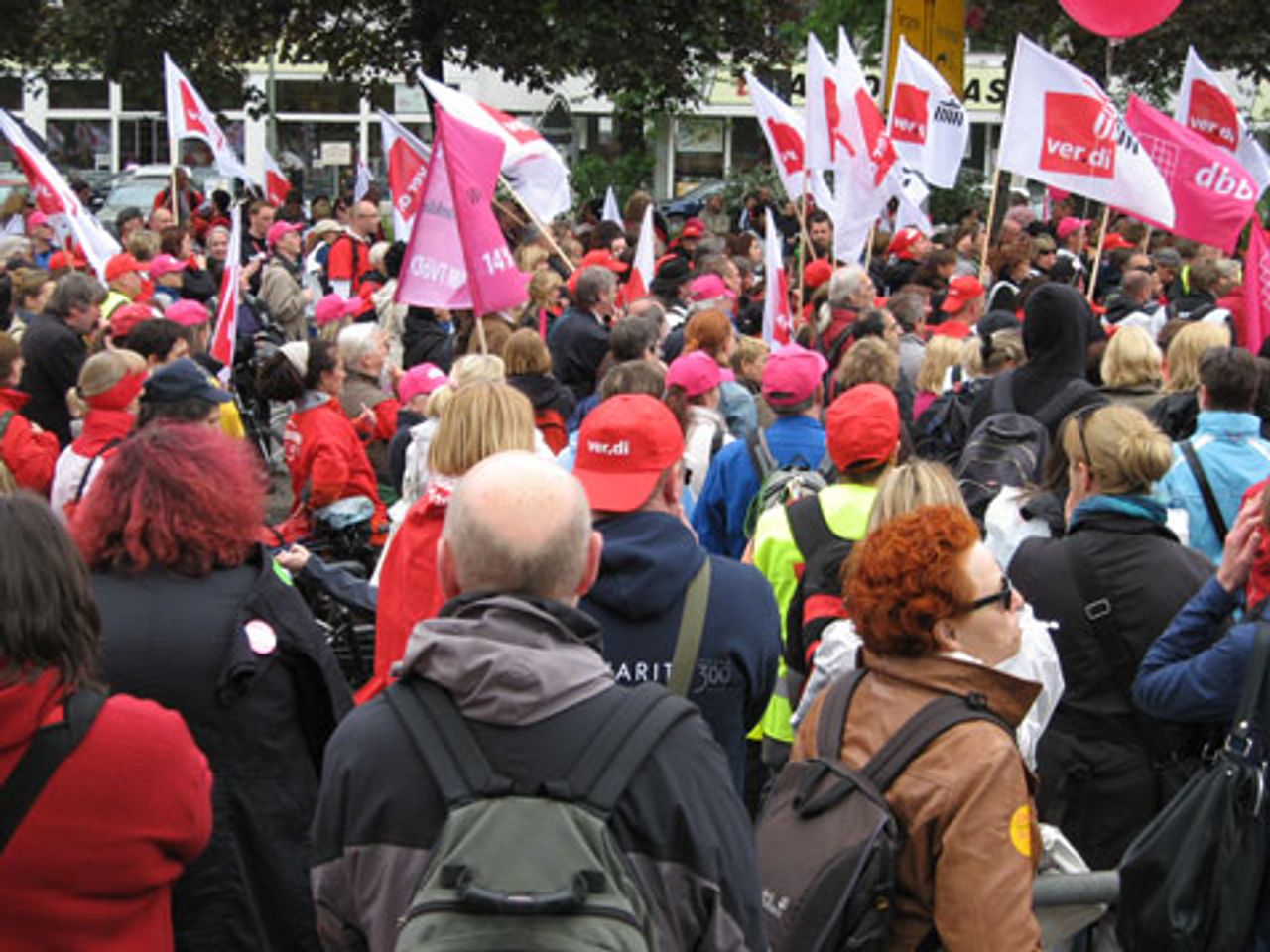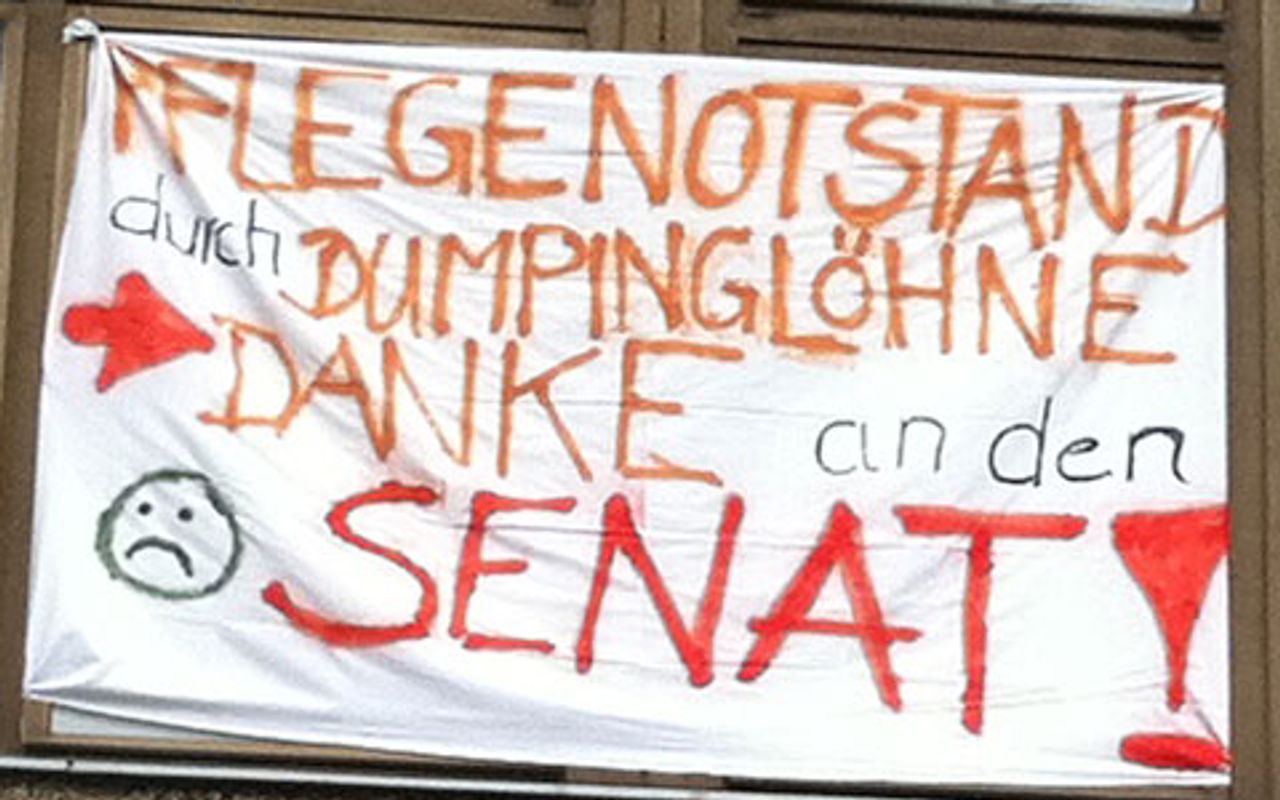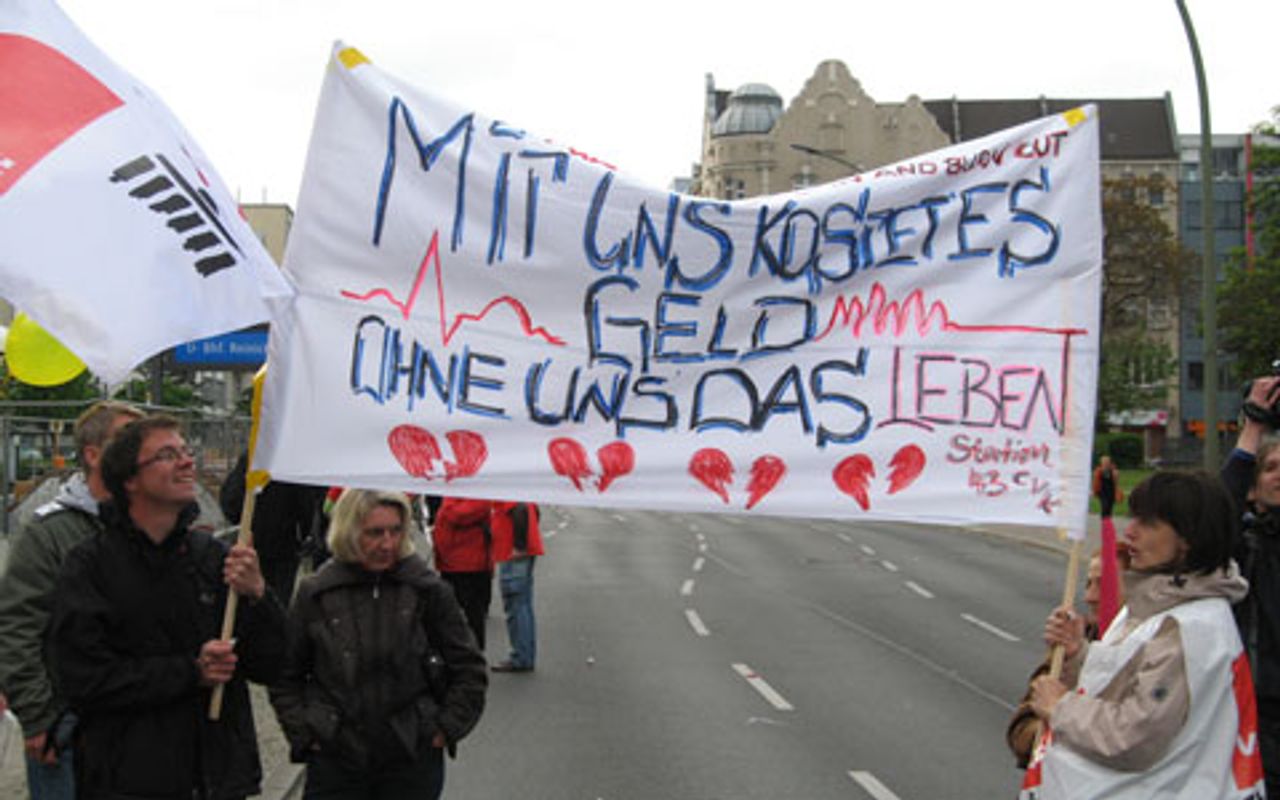 On Tuesday May 3, 2,500 employees from Berlin’s Charité university hospital took part in a demonstration across the city. The Charité, the medical school for both Humboldt University and the Free University of Berlin, is the largest university hospital in Europe, with a total staff of around 13,000.
On Tuesday May 3, 2,500 employees from Berlin’s Charité university hospital took part in a demonstration across the city. The Charité, the medical school for both Humboldt University and the Free University of Berlin, is the largest university hospital in Europe, with a total staff of around 13,000.
The hospital’s nursing staff have been on strike since the start of the week demanding a wage increase of €300 per month and better working conditions. Protesting staff also demand equal wages for employees from eastern Germany, who currently earn 20 percent less than their colleagues in the west for carrying out the same work. Moreover, they are calling for the introduction of wage agreements for transport workers and kitchen staff. On the second day of the strike, the Charité management offered a wage increase of €180, which the strikers unanimously rejected.
Demonstrators told WSWS reporters about the difficult working conditions under which they carried out their highly responsible and poorly paid jobs. For years the Charité has hardly hired any new skilled staff. Sick or retired nurses are simply not replaced.
 "Healthcare Emergency due to dumping wages thanks to the Senate"
"Healthcare Emergency due to dumping wages thanks to the Senate"A worker in the pediatric radiology department, Mehmed, said that most of his overtime hours are not registered and thus not paid. He, like most of his colleagues, was critical of the way the union at the hospital, ver.di (Vereinte Dienstleistungsgewerkschaft―United Services Union), has been handling negotiations with the hospital’s management.
An employee from the rheumatology department had her workload increased by 20 percent during the last year, without an increase in wage.
Nurses from intensive care reported that the lack of personnel is increasingly forcing them to do the work of doctors. This additional workload is not paid, but in the event of a failed treatment, they have no legal protection and can be held liable.
Max has been working at the Charité for eight years as a male nurse in the neurology department for €8.50 [US $12.63] an hour. He criticized in particular the fact that young employees have no financial improvement to look forward to. Cuts and sacrifices are being demanded incessantly from the nursing staff, without any attempt being made to secure jobs or improve conditions. In that way the nursing profession threatens to become a low-wage occupation.
In view of the dubious role played by the unions in the nurses’ labour action, Max sees no point in joining a union himself. He criticised the fact that none of the established parties and organisations stands up for the interests of the working population.
Alex, a young male nurse from the accident surgery department, noted that things have been continuously going downhill at the Charité since he started working there in 2005. Insufficient payment and difficult working conditions force many young skilled employees to leave the university hospital after their training is finished. Personally, he is very distraught by the working climate in the hospital, he says. He does not feel like a genuine member of staff at the Charité.
While newspapers such as the Berliner Zeitung are trying to whip up the population against the strikers, the hospital workers emphasise that their dispute is being waged in the interests of the sick and of their patients, on whose backs the austerity measures are being carried out.
In light of the prevailing working conditions, care personnel are unable to adhere to their professional code and carry out the work expected of nurses. Serious discussions among staff are no longer possible due to time pressures, and their work is limited mainly to the immediate medical needs of patients.
Sarah and Bernd from the radiology department reported how the nursing profession is becoming more and more a “service sector”. The constant reduction of jobs, chronic understaffing and the overworking of nursing staff meant that they had no time left to treat patients as human beings.
Many of the strikers are sceptical about the union following their experiences of the 2006 strikes. The struggle at that time was ultimately unsuccessful because in 2007 ver.di accepted a wage agreement that led to further deteriorations in working conditions.
Strikers are also disappointed in the negotiations that have been taking place since November 2010―so far without any result. Many have the impression that ver.di officials were not really interested in pushing through with their demands. Thus, numerous strikers, especially younger workers, are not organized in the union or have only joined it recently to support the current strike.
At the demonstration on Tuesday, union officials played the well-known card of setting workers against one other: doctors against nurses, Charité employees against those in other hospitals in Berlin, and the hospitals in Berlin against those in the state of Baden-Württemberg.
 "With us it costs money, Without us it costs lives"
"With us it costs money, Without us it costs lives"As usual, the demonstrators were told how “great” they were. The protest was an “unbelievable success”, “nobody had expected so many strikers”, etc. At the same time, however, the unions made clear that an improvement of the situation at the Charité would depend on the policies of the Berlin Senate [the executive body that governs the city]. After all, they argued, the cause of the problems at the hospital was that the Charité was not “competitive” enough. And why was it not competitive? Because the Berlin Senate did not make enough effort to encourage investors.
The representative of ver.di acknowledged that she was not intending to fight against the systematic privatisation of the Charité, even though the majority of protesters demanded an end of privatisation measures, which they rightfully associate with the continuous deterioration of their working conditions.
Aside from some hardened union bureaucrats, only representatives of various middle class “left” groups, supported ver.di unconditionally. They tried to conceal the treacherous role of the unions at the Charité in their leaflets and foment the illusion that this time around workers’ demands could be pushed through with the aid of the union officialdom.
The truth is that ver.di has a major share of responsibility for the conditions against which the strikers are fighting. It is only due to the support of the union bureaucracies that the massive cuts bound up with the dismantling of welfare provisions in Berlin and the privatisation of the Charité could be pushed through.
The unions are using the same tactics they employed in 2006. At that time the unions first used delaying tactics in the wage negotiations, then they organized a short-lived strike so workers could vent their anger, sent them home tired and defeated, and eventually signed an agreement whose purpose was to pave the way for further cuts.
